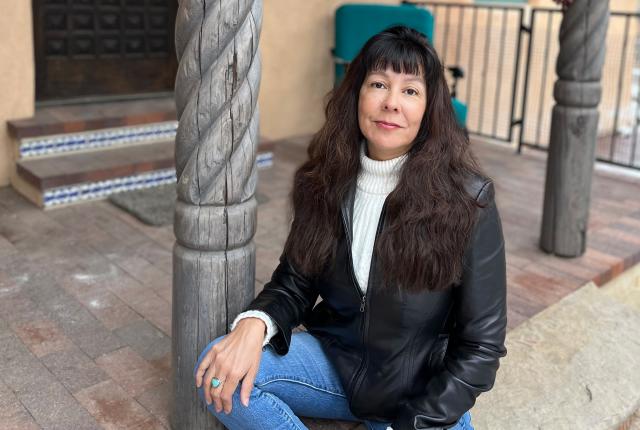DEBORAH JACKSON TAFFA WAS A TEENAGE REBEL. During high school in Farmington, she embraced her Indigenous identity, which set her apart in an era that emphasized a certain kind of kitschy conformity. “It was the late 1980s,” she says. “The Reagan era. The Material Girl era. It was cool to be a Young Republican. To be an artist was the only honest thing I could figure out to do.”
Taffa’s Whiskey Tender (Harper), a memoir about growing up as a citizen of the Quechan (Yuma) Nation and Laguna Pueblo, debuted in February and earned a mention in the New York Times as an anticipated release. National Book Award winners Colum McCann and Tommy Orange both praised it.
Although she’s excited for the accolades, Taffa is much more invested in the creative process. She worked on Whiskey Tender for more than 20 years, even as mentors, colleagues, and award committees insisted it was time to sell the book. “It’s easy to get caught up in and be shaped by the publishing world,” she says. “Writing alone at my desk has always been more important than making my memoir generate an income.”
Now in her 50s, Taffa directs the MFA program in creative writing at the Institute of American Indian Arts (IAIA), in Santa Fe, and has a lengthy list of published essays and articles. In Whiskey Tender, she links her family history and personal journey to the larger issues of colonialism and Indigenous identity. The memoir features a nuanced account of how racism, concepts like blood quantum, and the American edict to rise above her circumstances played out in her family and the communities where she lived.
Taffa’s father moved the family from the Yuma reservation in California to Farmington, where he got a job at the Four Corners Power Plant, the same year three teens murdered three Navajo elders. Their light sentences inspired protests by Diné activists and an investigation by the U.S. Commission on Civil Rights. Indian self-determination was gaining traction nationally, but at school, Taffa heard Native American history lessons that focused on atrocities against her people and belittled her culture. “Academia can make you feel like believing in Mother Earth is primitive. The very system that’s supposed to prepare us to go to college is also snubbing us at our Indigenous core,” she says. “It’s an incredible act of rebellion to walk in two worlds successfully.”
Writing a memoir rather than fiction follows that path. While there has been a boom in Native literature over the last several years—including works by writers from the IAIA—many Native writers prefer to disguise the truth of their lives in fiction, Taffa says. “I wanted to write a book that Indigenous readers could connect to immediately and see themselves in without apology.”
Taffa hopes her work can help her students and others continue the momentum of Natives writing across literary genres. “They’re becoming influential in society, and that’s very encouraging to me,” she says. “But I still want to model a slower writing process. Everyone is in a rush to get their story out. Take your time. You only get one chance to make your debut.”



